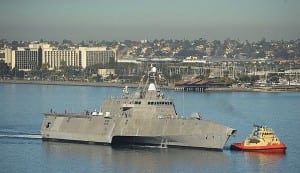The House Appropriations Defense panel’s fiscal year 2021 draft bill recommends preventing the Navy from decommissioning any Littoral Combat Ships (LCSs) and restricts a pilot private ship maintenance program.
The LCS provision prohibits using funds to decommission any LCSs, a stronger measure that in the House Armed Services Committee’s draft defense authorization bill.

The authorization bill would prohibit the Navy Secretary from retiring the third and fourth vessels, USS Fort Worth (LCS-3) and USS Coronado (LCS-4), until after certifying each LCS mission module has finished all operational tests (Defense Daily, June 23).
Both efforts are in response to the Navy’s FY ’21 budget request plans to decommission the first four LCSs, which the Navy argued would save $1.2 billion over five years while upgrading them would cost too much (Defense Daily, Feb. 10).
“The Committee is concerned with the Navy’s proposal to decommission the first four Littoral Combat Ships well before the end of their service lives,” the bill report said.
It said while the Navy asserts a goal of 355 ships, annual budget requests do not support the position and “the Committee believes it is shortsighted for the Navy to always procure new ships, rather than effectively maintaining and upgrading the ships currently in the Navy’s inventory.”
The bill also directs the Secretary of the Navy to submit a report to the defense committees within 30 days of the bill being enacted on what upgrades would be needed for these LCS ships to effectively conduct operations in the U.S. Southern Command area of responsibility.
“The Committee is also concerned with the lack of a United States naval ship presence in Central and South America and believes that Littoral Combat Ships could be effective for the missions required in the Southern Command area of responsibility,” the bill report said.
Separately, the panel recommended sharply reducing funds for a private contracted ship maintenance pilot program after the Navy requested more funds but did not analyze the results of the program. It noted the Navy requested $1.26 billion to continue the program, but quarterly updates “do not include viable metrics to determine whether the program is successful and should be continued.”
Thus, the subcommittee recommends funding the program at only $816 million, a $445 million cut from the request.
This budget line comes from the FY ’20 appropriations act that provided funds for a pilot program to fund $1 billion in private contracted ship maintenance planned for the Pacific Fleet in FY ’20.
Navy FY ’21 budget request documents said the FY ’20 pilot program funds 16 Pacific Fleet private contracted availabilities under the funding line.
The administration’s FY ’21 budget requested $1.26 billion to “improve our ability to execute the potential benefits” of conducting the trial.
Budget documents argue funding private contracted ship maintenance planned for the Pacific Fleet through the pilot program allows the Navy to implement commercial best practices for ship maintenance and the ability to avoid the use or lose aspect of funds in the 4th quarter of the fiscal year.
The bill report said it recommends funding provided under this pilot program should be restricted to activities executed in the U.S. and is designated a congressional special interest item. It would restrict the Secretary of the Navy from using the funds until after providing the defense committees an execution plan with updated quarterly report.
The plan must include data points for each ship in the pilot program including ship class, hull number and name; type of availability; location of work; execution plan start and end dates; and funds for the execution plan.
Quarterly updated plans are due within 15 days of the end of each fiscal quarter listing the same information but using actual or current estimates of start and end dates and actual funds and estimates to completion.
The provision also directs the Navy Secretary to establish performance metrics for the program “to measure against the metrics quarterly, and to submit a written analysis to the congressional defense committees not later than 45 days after each quarterly performance evaluation.”
The full House Appropriations Committee is due to markup the defense appropriations bill on July 14.